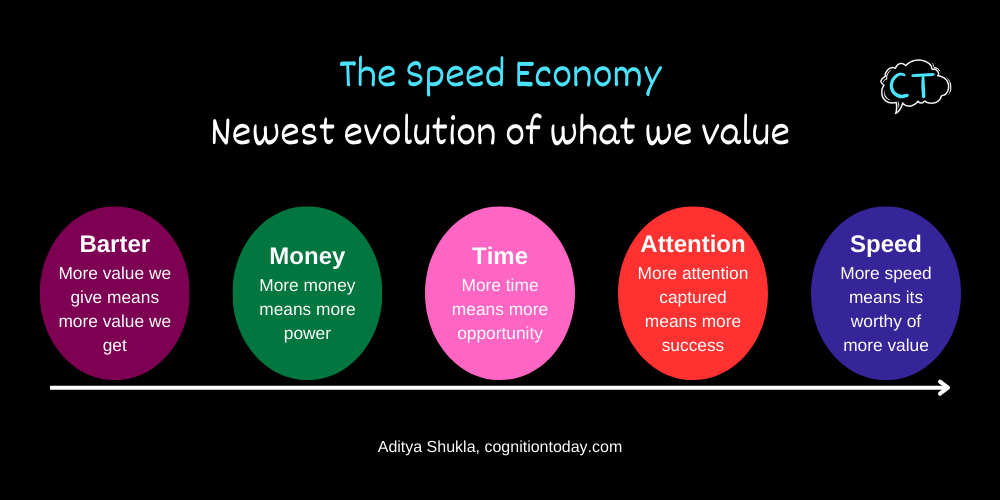Will you be happy if your food delivery took just one minute? Not because it was cooked faster with pre-processed ingredients, but because future technology sent it 30 minutes back in time?
Yes? We don’t yet have that solution yet. But we have the problem it will solve.
What changed in our economy since the Bronze Age was the speed at which things change – the rate of change – the speed of social media, the speed of getting medicines, the speed of getting deliveries, the speed of conversations, the speed of television media. All these increases in speed made us expect and want speed. So, the technology that was developed alongside also supported speed through faster data, faster downloads, faster processing, shorter videos, dedicating just a few seconds to acquire information, etc. It became a positive feedback loop where everything gets faster, and we expect it to keep getting faster, so someone builds technology that makes things even faster. Everything from content to home delivery focused on speed. Everyone fed the consumers’ expectations of speed. Naturally, the consumer habits changed – expecting and getting comfortable with speed.
I call this the speed economy. Value is proportional to speed.
This speed economy, as I define it, has 3 components.
- Speed Habituation: We are habituated to getting things faster, and we expect things to be fast. Be it cooking, home delivery, downloads, dating, reaching travel destinations, etc. We favor faster decisions and faster judgments.
- Speed premium: We are ok to pay more for speed.
- Amplified rewards: We think getting a reward faster makes the reward bigger.
The axiomatic definition: The Speed Economy is a system where value is a function of time-to-reward.
The Indian market is a case study for this. Quick commerce (q-commerce) has grown at an unbelievable rate. Gross Merchandise Volume (GMV – total value of goods sold via q-commerce services) increased from $100 Million in 2020 to $3.3 Billion in 2024.[1]That’s a 33x growth!
Consumer buying trends also show that “faster is better“. In another report[2], 48% of consumers preferred faster deliveries, and 44% preferred cheaper deliveries. Value is being assigned to speed because speed has become synonymous with faster rewards, and speed has also become a solution to a busy life with high stress.
Amazon disrupted the world in 2005 when it launched its 2-day delivery. That may have triggered a primal greed (or goal) to break the speed barrier every year. That 2-day expectation has evolved into companies successfully managing 10-minute deliveries for the same products. Whether or not this is feasible from a long-term economic point of view is a different story. But this evolution in quick-commerce fueled technologies that enable speed, and now speed is a habit of our society.
This barrage of speed created a problem – what happens when you are used to speed, and you have to get comfortable with something slow? People get uncomfortable with the lack of speed. The lack of speed triggers an avoidance system in us through which we reject, ignore, or avoid things that feel slow. We begin devaluing things that are slow because now we have a very high standard of convenience.
Look at a casual example – the movie is boring, nothing is happening in it – what do you do? Begin looking at your phone for a faster delivery of emotions via reels (that’s what I do).

Why this speed economy is going to flourish
The main mechanism of this speed economy is the sense of reward. Let’s define the reward – it’s everything you desire – the food, the consumer products, the conversations, the decisions, the end of a movie, the end of a problem, etc. Whether something is good or bad, we have learned to expect it faster.
The “Let it stop right away” vs. “I want it now”.
The oldest motivation for a species is the approach vs. avoidance motivation: approach something good, avoid something bad. In this case, good is our reward. Bad is not a reward. The speed enables faster access to the reward, so naturally, it is a “mutually agreed-upon” convenience. Only a minority tend to choose a slower delivery date or a longer waiting period. That usually happens, when there is some other benefit for choosing “slower” things.
So, we use speed as the optimal strategy to seek rewards.
AI has been the latest product of the speed economy – people don’t have to search for information, they get what they need faster in a conversation. You must have noticed – sometimes, ChatGPT and similar AIs give long responses, but they are generated very quickly. Let me ask you – is that frustrating? Did you expect a short, magical answer that you barely have to read?
That’s the speed economy changing your behavior.
We expect to receive our reward fast. Information is not a reward until it is understood, so the lengthy responses are frustrating because it takes time to convert the information into something the brain perceives as a reward. That frustration is the brain finding access to the reward slowly, even if the speed at which the reward was shown to you was high.
Even high speed is not enough – the craving for speed is high, and it will continue to rise till it reaches a threshold.
That was so quick… Now what?
Let’s call it the “Now what?” threshold – the pleasure threshold – in which we will begin valuing slowness again.
Consider – you order food, and it is teleported to your house. Someone invented that technology and it is used for delivery.
Someone found a way to make elaborate dinners in 20 seconds. Or better yet, we invent time travel and learn to send things just a few minutes back in time so that everyone gets everything as fast as possible even if getting those things ready takes time.
Now, let’s look at the consumer side. Consumption takes time, but let’s say consuming food and media also becomes fast. So fast that we lose the value of time. A song becomes 20 seconds long, so there isn’t much to enjoy. So we begin craving 3-minute songs again so we can engage with them in a pleasurable way.
The Now what? threshold is this – We receive the stuff we want very fast. So we have a lot of time to spare. But since everything is fast, there isn’t much to do. Everything is so fast, we can’t find a way to enjoy it. There are physical constraints on a reward that make it pleasurable. At this pleasure threshold, beauty dies. Slowing down lets us engage in the beauty, so there is something to find pleasure in.
A good song can’t be compressed to just 10 seconds for you to enjoy it the same way. Similarly, the sensory fun of eating food can’t be compressed into a 20-second-long experience.
Think – a day takes 24 hours, but imagine the day and night speeding up to the point where a whole day gets over in what used to be hours and continues speeding up to a point where years pass within seconds – the sun and moon become alternating white and yellow stripes in the sky.
Failure condition of the speed economy: Sense of reward is diminished by speed itself.

When speed rises to that extent, we lose the value of pleasure. So, this pleasure threshold will essentially keep the speed economy in check. And that is why, it is here to stay – only to the speed at which pleasure/reward stays as a reward.
Time legitimizes pleasure, so speed has its limit.
P.S. You are now a JoJo reference.
Sources
[2]: https://ecommercedb.com/insights/ecommerce-delivery-expectations-2023-speed-beats-price/4635
[3]: https://jojowiki.com/File:MiHwithPucci.png

Hey! Thank you for reading; hope you enjoyed the article. I run Cognition Today to capture some of the most fascinating mechanisms that guide our lives. My content here is referenced and featured in NY Times, Forbes, CNET, and Entrepreneur, and many other books & research papers.
I’m am a psychology SME consultant in EdTech with a focus on AI cognition and Behavioral Engineering. I’m affiliated to myelin, an EdTech company in India as well.
I’ve studied at NIMHANS Bangalore (positive psychology), Savitribai Phule Pune University (clinical psychology), Fergusson College (BA psych), and affiliated with IIM Ahmedabad (marketing psychology). I’m currently studying Korean at Seoul National University.
I’m based in Pune, India but living in Seoul, S. Korea. Love Sci-fi, horror media; Love rock, metal, synthwave, and K-pop music; can’t whistle; can play 2 guitars at a time.



























